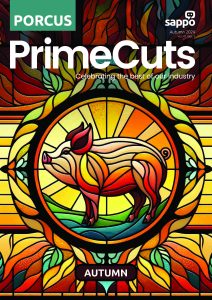Only a quarter of 2023 remains, and the SAPPO team still has so much to achieve. There is, though, sufficient time for SAPPO to complete the implementation of many of its ambitious projects, a period of consolidation and execution.
Our focus as SAPPO is to build an organisation that serves the needs of our members, the pig farmers, while they build sustainable agribusinesses for themselves and future generations. In this modern world where knowledge and information are key drivers of decision-making to allow the best possible direction and actions, SAPPO’s World of Pork plays an ever-increasing role.
The initiatives that need to mature include, among others, traceability, biosecurity, passive surveillance and the environmental, social, and governance (ESG) framework.
The World of Pork Animal Movement app pilot project has been successfully completed and broad roll-out to all pig farmers is underway. At present, the percentage of movements logged is low in comparison to the number of animals slaughtered. The logging of animal movements has several advantages, including traceability data, which would be of immense value in disease outbreaks, while lending credibility to our reporting to trade partners on the origin of pigs and their pork products destined for export. An even more important advantage to all members is that the verification of animals slaughtered, declaration by buyers of members’ pigs, and consequent levies paid over to SAPPO can be audited (SAPPO’s auditors qualified our financial statements as they could not verify that all levies due were received).
The development of the Biosecurity Assessment system is complete, with several audits already having been completed. The primary goal of this biosecurity assessment is to cater for farms that, for a variety of reasons, could not become compartments but needed to satisfy disease risk questions posed by the buyers of their pigs. In its development, lessons learnt during biosecurity assessments completed in the KwaZulu-Natal foot-and-mouth disease (FMD) Disease Management Areas (DMA) were invaluable to allow movement to abattoirs of pigs in the DMA.
SAPPO’s Passive Surveillance app is an integral part of continually checking that diseases of trade importance are not present. Any visit to a farm by a veterinarian should be logged on the system, at which time the veterinarian attests to the fact that no abnormal diseases are present. Recent visits by veterinary services from our trading partners highlighted the importance of being able to verify that vets visit pig farms, in particular compartments, on a regular basis. Initially, a high number of visits were logged, but this has recently declined, which, as SAPPO, we need to address.
Sustainable Development Goals (SDG) have become a major focus throughout the world. SAPPO began a project to ensure that as a pork industry we are proactively embracing SDG principles through ESG compliance. Pig farmers in the future will need to comply with corporate, especially the financial sectors’, ESG requirements to operate. Research done on behalf of SAPPO indicated that Pork 360 standards go a long way to addressing key elements of ESG. SAPPO will continue to engage with knowledgeable sources around our ESG programme, for example, recent discussions with Rabobank’s sustainability team, to ensure that Pork 360 standards will remain relevant in future.
SAPPO is committed to serving the pig farming community, so that it (remains) a sustainable, vibrant agribusiness.








